book
The apocalypse in film : dystopias, disasters, and other visions about the end of the world / edited by Karen A. Ritzenhoff, Angela Krewani London: Lanham Rowman & Littlefield, c2016.
Call No: 740.1 APOSource: UKPlace: LondonPublisher: Lanham Rowman & LittlefieldPubDate: c2016PhysDes: xxii, 231 pages : illustrations ; 24 cm.Subject: APOCALYPSE IN FILMS ; DISASTER FILMS ; CIVILISATION (US, Raymond B. West, 1916) ; [FOUR] 4 HORSEMEN OF THE APOCALYPSE, THE (US, Rex Ingram, 1921) ; BED SITTING ROOM, THE (UK, Richard Lester, 1969) ; [DOCTOR] DR STRANGELOVE: OR, HOW I LEARNED TO STOP WORRYING AND LOVE THE BOMB (UK, Stanley Kubrick, 1964) ; MELANCHOLIA (DK/SW/FR/G, Lars von Trier, 2011) ; OFFRET [SACRIFICE, THE] (SW/FR, Andrei Tarkovsky, 1986) Summary: We live in a world at risk. Dire predictions about our future or the demise of planet earth persist. Even fictional representations depict narratives of decay and the end of a commonly shared social reality. Along with recurring Hollywood blockbusters that imagine the end of the world, there has been a new wave of zombie features as well as independent films that offer various visions of the future.
The Apocalypse in Film: Dystopias, Disasters, and Other Visions about the End of the World offers an overview of Armageddon in film from the silent era to the present. This collection of essays discusses how such films reflect social anxieties—ones that are linked to economic, ecological, and cultural factors. Featuring a broad spectrum of international scholars specializing in different historical genres and methodologies, these essays look at a number of films, including the silent classic The Four Horsemen of the Apocalypse, the black comedy Dr. Strangelove or: How I Learned to Stop Worrying and Love the Bomb, the Mayan calendar disaster epic, 2012, and in particular, Lars Von Trier’s Melancholia, the focus of several essays.
As some filmmakers translate the anxiety about a changing global climate and geo-political relations into visions of the apocalypse, others articulate worries about the planet’s future by depicting chemical warfare, environmental disasters, or human made destruction. This book analyzes the emergence of apocalyptic and dystopic narratives and explores the political and social situations on which these films are based. Contributing to the dialogue on dystopic culture in war and peace, The Apocalypse in Film will be of interest to scholars in film and media studies, border studies, gender studies, sociology, and political science. -- taken from publisher's siteNotes: Includes bibliographical references and indexISBN: 9781442260276Donation: donated by Senses of Cinema, 2016Contents: Introduction / Karen A. Ritzenhoff and Angela Krewani -- THE EARLY DEPICTIONS OF DISASTER. World War One and Hollywood's First Modern Armageddon: Understanding Wartime and Post-Conflict Representations of a Global Cataclysm in Civilization (1916) and The Four Horsemen of the Apocalypse (1921) / Cle´mentine Tholas-Disset -- The end of the world: loss and redemption in Four horsemen of the apocalypse / Karen Randell -- GLOBAL DEMISE AND COLD WAR. "Radiation's rising, but one mustn't grumble too much": nuclear apocalypse played as farce in Richard Lester's The bed-sitting room / Thomas Prasch -- The legacy of Dr. Strangelove: Stanley Kubrick, science fiction blockbusters and the future of humanity / Peter Kra¨mer -- "Gentleman, you can't fight in here": gender symbolism and the end of the world in Dr. Strangelove and Melancholia / Catriona Mcavoy -- MELANCHOLIA AND OTHER REPRESENTATIONS OF THE APOCALYSPE. Is there an end to it? fictional shelters and shelter-fiction / Solvejg Nitzke -- Melancholia and the apocalypse within / Pierre Floquet -- Eco apocalypse: environmentalism, political alienation and therapeutic agency / Philip Hammond and Hugh Ortega Breton --POLOITICS OF SHOWING THE UNTHINKABLE. Disaster films: the end of the world and the risk society hero / Frederick Wasser -- The (gender) politics of disaster in 2012 / Charles Antoine Courcoux -- Tarkovsky's The sacrifice: a religious humanist apocalypse / Tatjana Ljuji -- Dead narratives: defining humanity through stories / A. Fiona Pearson and Scott Ellis -- MOVING BEYOND THE END OF THE WORLD. Opposing Thatcherism: filmic apocalypse as a political strategy in 1980s Britain / Angela Krewani -- Painting in time: on the use of digital visual effects in Melancholia / Andreas Kirchner -- The corporate and corporeal: min(d)ing the body conscience and consumption in early 21st century Hollywood dystopia / Wendy Sterba.
More info
book
Film at the intersection of high and mass culture / Paul Coates Cambridge [England] New York: Cambridge University Press, 1994.
Call No: 408 COAAuthor: Coates, Paul, 1953 Place: Cambridge [England] New YorkPublisher: Cambridge University PressPubDate: 1994PhysDes: xvii, 201 p. ; 24 cmSeries: Cambridge studies in filmSubject: POPULAR CULTURE AND THE CINEMA ; SCIENCE-FICTION FILMS ; MELODRAMA ; WESTERNS ; FILM NOIR ; ETHNIC GROUPS IN FILMS ; STARS ; GENRES ; HORROR FILMS ; VOICE OVER ; MUSIC TELEVISION ; SIRK, DOUGLAS ; MARKER, CHRIS ; TARKOVSKY, ANDREI ; KIESLOWSKI, KRZYSZTOF ; FRANJU, GEORGES ; STALLONE, SYLVESTER ; VALENTINO, RUDOLPH ; LANG, FRITZ ; LEE, SPIKE ; MADONNA ; MONROE, MARILYN ; POTTER, DENNIS ; BEDROOM WINDOW, THE (US, Curtis Hanson, 1986) ; FLY, THE (US, David Cronenberg, 1986) ; JETEE, LA (FR, Chris Marker, 1963) ; MAN WHO SHOT LIBERTY VALANCE, THE (US, John Ford, 1962) ; AUFZEICHNUNGEN ZU KLEIDERN UND STADTEN (GW, Wim Wenders, 1989) ; OUT OF THE PAST (US, Jacques Tourneur, 1947) ; ROCKY IV (US, Sylvester Stallone, 1985) ; OFFRET [SACRIFICE, THE] (SW/FR, Andrei Tarkovsky, 1986) ; SEARCHERS, THE (US, John Ford, 1956) ; SINGING DETECTIVE, THE [TV] (UK, Jon Amiel, 1986) ; SOLARIS (UR, Andrei Tarkovsky, 1972) ; WESELE (PL, Andrzej Wajda, 1972) ; DAY OF THE LOCUST, THE (US, John Schlesinger, 1975) ; REAR WINDOW (US, Alfred Hitchcock, 1954) Notes: Includes bibliographical references (p. 182-194) and indexISBN: 0521444721 (hardback)LON: 10419843
More info
title clippings file
OFFRET : (SW/FR, Andrei Tarkovsky, 1986)
More info
book
Sculpting in time : reflections on the cinema / Andrey Tarkovsky ; translated from the Russian by Kitty Hunter-Blair New York: Alfred A. Knopf, 1987.
More info

